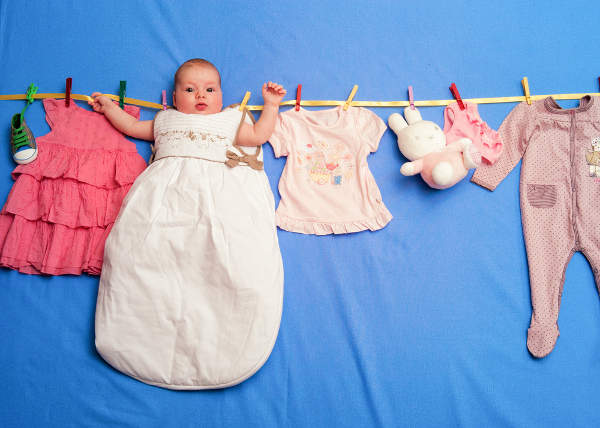Picture the scene. It’s 2am. Your baby wakes for a feed. Your nurse them or give them a bottle and then pop them back down in their Moses basket or crib and hope for best. Five minutes later he or she is still awake. Ten minutes later, 20 minutes later, 30 minutes later, and your baby is still smiling and gurgling away. Sound familiar? You are not alone. Many parents have experience of nocturnal babies.
After spending nine months inside a cosy dark space babies have no concept of day and night. Furthermore, many new-born babies have an internal clock that wakes them up in the early hours because that’s when you, as their mother, were most still, whereas during the day your normal movement provided a gentle rocking motion to help your unborn baby sleep.
Thankfully, there are a few things you can do to ease your baby into a more socially acceptable sleeping pattern. Your baby will probably need night time feeds until they are several months old, but you can still encourage them to have the bulk of their sleep during the night.
Routine. Routine. Routine.

This cannot be stressed enough. Babies love routine. They thrive on it. It helps them to make sense of the world around them. A bed time routine will help your baby to learn that he or she is coming to the time of day when it’s time to go to sleep. Most experts agree that from around six weeks old your baby can understand a routine and the implications of it (“Mummy is putting me in the bath, that means I will be going to sleep soon”). If you are travelling around a lot visiting relatives then sticking to a bedtime routine can also help your baby to adjust to their new surroundings.
Most parents tend to follow the four “Bs” of bedtime: Bath, Boob / Bottle, Book, Bed. A warm bath helps your baby to relax, a feed ensures their tummy is nice and full, and a story snuggled up with Mum or Dad is a great, calm and quiet way to end the day, plus it helps your baby’s language development. Stick with the routine and your baby will soon learn to associate it with sleep.
Be Boring At Night And A Delight During The Day

Your nocturnal baby doesn’t understand the difference between night and day, but there are a few subtle things that you can do to teach them. If you can, do all day time feeds in a room that is different to your bedroom. Have the radio or TV on in the background. Sing to your baby whilst you feed them. After their feed, try putting them in a bouncing chair and spending a few minutes showing them different toys and talking to them.
At night time, be boring. If you can, do all of the feeds in your bedroom with a dimmed light or in the dark. Keep sounds to a minimum and talk quietly. This helps your baby to understand that there is a distinct difference between night and day and that night time is quiet time.
Have Special Sleepwear

New-borns tend to live in onesies and sleepsuits, and in the early days you don’t want to be doing a lot of laundry, so it’s tempting to put your baby to sleep in the same sleepsuit he or she wore during the day. However, having a specific set of clothing that you only use at night can help your baby to understand that it’s time to go to sleep. Baby sleeping bags are especially useful for this trick as your baby will soon associate them with sleep, though they are generally not suitable for babies who weigh less than 9lbs.
Naps Are Important

It might be tempting to reduce the time your baby spends napping during the day in an attempt to get them to sleep, but as strange as it sounds this is actually counterintuitive. Instead you will have an overly tired baby who is likely to experience a disrupted sleep. The average new-born baby needs around 16 hours of sleep a day, reducing to around 14 hours at aged six months. Ensuring your baby gets enough naptime during the day means that he or she will not be over tired and over-stimulated at bedtime.
Things Can Only Get Better

You might find yourself close to despair after several weeks of disrupted sleep. Hang in there. This stage will soon pass. Most babies have achieved some sort of sleeping pattern by 12 weeks with the bulk of their sleep being at night-time. You will of course experience night time wakings for a good while after this point, but you will also adapt to this new routine. If you were a firm 8 hours a night girl before you had your baby you will surprise yourself on how little sleep you actually need to function.




